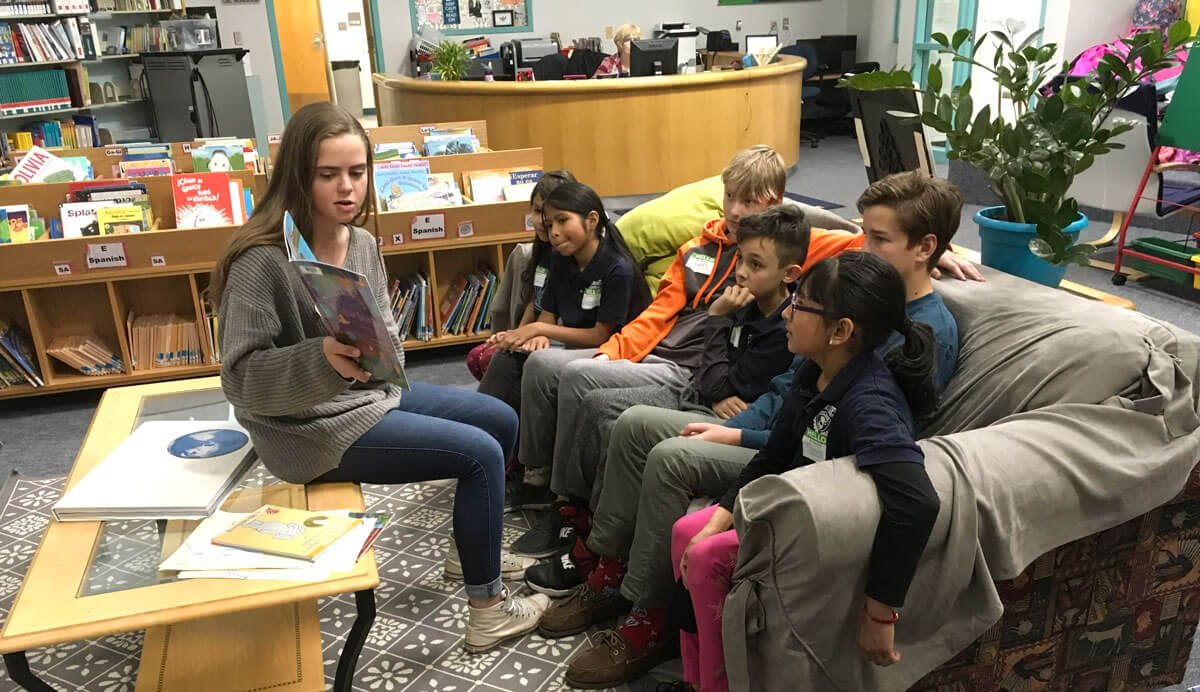Some students traveled to El Paso, Texas to study the complexities of the border between the U.S. and Mexico and the many ways El Paso citizens adapt to the ebb and flow of migration.
Other students traveled no further than Denver South High School, where they spent a day shadowing and interviewing immigrant students from around the world.
Still others uncovered their family’s history doing genealogy research at the Denver Public Library Central Branch.
And some students learned how close many people live to the edge of homelessness and came away saying, “This experience will change the way I look at people I see on street corners.”
These were just some of the many rich and varied experiences that students had during Colorado Academy’s first Ninth Grade Intensive. For one cycle of classes (six days), students were freed from their regular schedules. “They could turn off the noise from multiple courses with multiple demands and do a deep dive into one subject,” says Upper School Principal Dr. Jon Vogels.
The majority of the students chose a course offering related to immigration, a topic which was grounded in ninth grade curriculum, because all students read and discuss Sonia Nazario’s national best seller, Enrique’s Journey, in their English classes. The book recounts the true story of a Honduran boy looking for his mother more than a decade after she is forced to leave her family in search of work in the U.S.
One group of students chose to spend their Intensive studying issues related to the homeless population in Denver. “Their Intensive was connected to the larger topic because they studied the laws and policies in place that make social issues complicated and difficult to solve,” says Tenth Grade Dean Emily Perez. All of the Intensives had in common the effort to unravel the complexity of societal issues like immigration and homelessness.
Traveling to El Paso
CA partnered with the World Leadership School to arrange the trip to El Paso. Escorted by Vogels and Perez, a dozen students traveled there to learn more about the people affected by systems in place on both sides of the border. Ulisses Rico Moncada chose this Intensive because he is the son of parents who immigrated to the United States, and he was “curious” about lives of immigrants on the border. “Many of the kids in the group had a strong view on immigration, but they put politics aside for this trip,” Rico Moncada says. “Students felt sympathy for some of the undocumented immigrants they saw seeking asylum.”
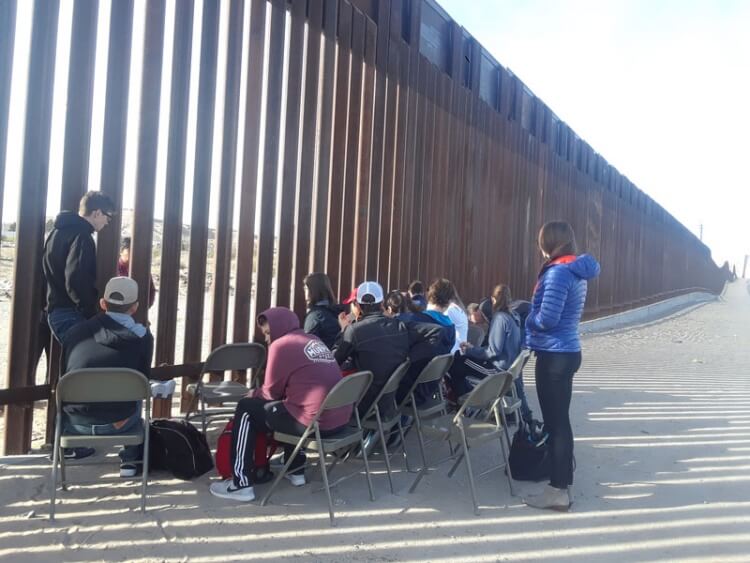
In Texas, the students visited a border area and a federal court where undocumented immigrants were being tried and sentenced. They worked in an after-school program with many undocumented children and met teenage immigrants. They also met with U.S. Border Patrol and with leaders of mission-driven organizations passionate about helping immigrants in countless small and large ways. They saw how government, nonprofits, law enforcement, and businesses work together at the border.
“The rationale for going to a border city was to see how it navigates this complicated issue,” Vogels says. “It’s a way of life in El Paso, because these people have been working on border issues for a long time, but now changing laws may affect people’s lives.”
“Students may have started with one idea, but then they meet an immigrant who is just trying to do what’s best for his family, and they realize, ‘I would do the same if it were my family,’” Perez says. “They started to see the human side of an abstract issue.”
Rico Moncada, who would like to become an immigration attorney, confirms Perez’s observations. “Being there and listening to stories from people about how they got there touched people in our group,” he says. “Immigration is not just a number—it’s actual people who want to come to the United States.”
Shadowing at Denver South
Ninth grader Molly Karst described taking a week to dive into Immigration and Journalism as a “nice break” from her regular schedule. “The Intensive had a lot of value, because you could bring all your effort to one project, and at the end you felt you had really accomplished something,” she says. “It shows that CA is really good at giving students the opportunity to bring their education full circle and apply it in a real-world setting.”
After learning the basic tools of journalism—doing research, conducting interviews, writing compelling articles, taking pictures, and fact-checking—students put those skills into action during meetings with Lt. Governor Donna Lynne and Governor John Hickenlooper, who shared his views that many immigrants bring a spirit of entrepreneurship to this country.
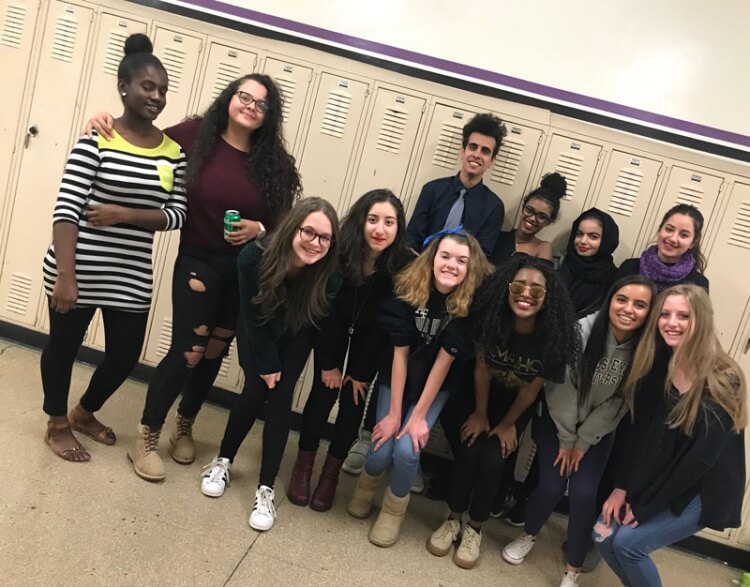
Students also spent a full day at Denver South, shadowing immigrant students from around the world, including Ghana, Iraq, Columbia, Democratic Republic of Congo, Mexico, Guinea and the Dominican Republic. They wrote articles about the students they met and illustrated the articles with photos they took.
Karst interviewed a young woman who was enrolled in DACA. “It was inspiring to talk with her, because she had such a positive story about how immigrants are looking for opportunity,” Karst says. “It also taught me about the challenges and stigmas that immigrants face.”
The subject of Karst’s article revealed that her father had ridden on a freight train to come to the United States from Mexico, much like Enrique did in Enrique’s Journey. “This experience brought perspective to the book we had read in class,” Karst says. “These things really happen, but you have to see it to believe it.”
The Immigration Legacy Project
This Intensive started with saliva—all the students submitted samples to AncestryDNA before the Intensive started. What they got back were personalized genealogical histories. “We wanted to remind students that everyone comes from somewhere,” says Upper School Librarian Lindsay Beatty. “All families have a story about coming to America.”
Students met with experts from the Denver Public Library genealogy department to research their family histories. With helpful coaching from reporters at Colorado Public Radio, students took the information they found and developed podcasts about their families’ origins.
Colby Lish learned that his mother’s great-grandparents had fled Austria because they were persecuted for being Jewish. He discovered census records for his great-great-grandfather at the library with details about the family. “It was shocking,” Lish says. “My grandmother didn’t know her father’s birthday, and there it was in the census. My family was amazed!”
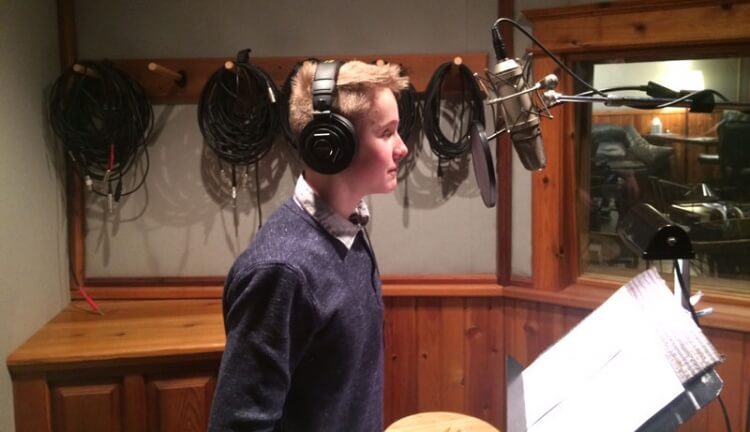
For Middle School Librarian Allie Bronston, the best moment of the Intensive occurred at the studio where students recorded their podcasts. “As I heard their voices coming through the microphones, I was so proud, because the act of storytelling gave meaning to their personal life history that had not existed before,” she says. “Many of the students referred to ‘the American Dream’ even though we had not given them that language. They had a better appreciation for the hard work and luck required to come to the United States.”
Lish concurs, saying that the research “puts you in the shoes of your ancestors.”
“It’s inspiring to think that your ancestors made such a courageous decision to leave everything they know and look for a better life,” he says. “It changed my perception of current immigrants. They’re not just coming here because it’s better. In some cases, they are afraid and have to find a safer life.”
Homeless in Denver
What is it like to have to struggle for even the most basic necessities? Who makes up Denver’s homeless population? These were the questions that prompted many ninth graders to sign up for an Intensive that included one very cold day walking in the shoes of homeless people. The course was led by Paul Augustus, Martha Smith, and Upper School Service Learning Coordinator Lisa Dean. Smith described their goal simply: “I wanted students to see the unseen.”
Talking with nonprofit leaders, students learned the challenges of conducting an accurate census of homeless people. They learned about recent legislation dubbed the “camping ban” which affects homeless people. Finally, they spent a day in groups of three students, and, with adult chaperones, walked the Denver streets assuming the persona of someone experiencing homelessness—a single mom with kids, a teenager, a veteran, an immigrant.
For Elle Smith, the experience was eye-opening. “I went into this Intensive thinking this will not be fun, and I will just end up behind in my classes,” she says. “But the course was so helpful for me and completely changed my perspective.” Elle candidly admits that she believed homeless people were “lazy” and “should just get a job.” Six days later, she had a new viewpoint.
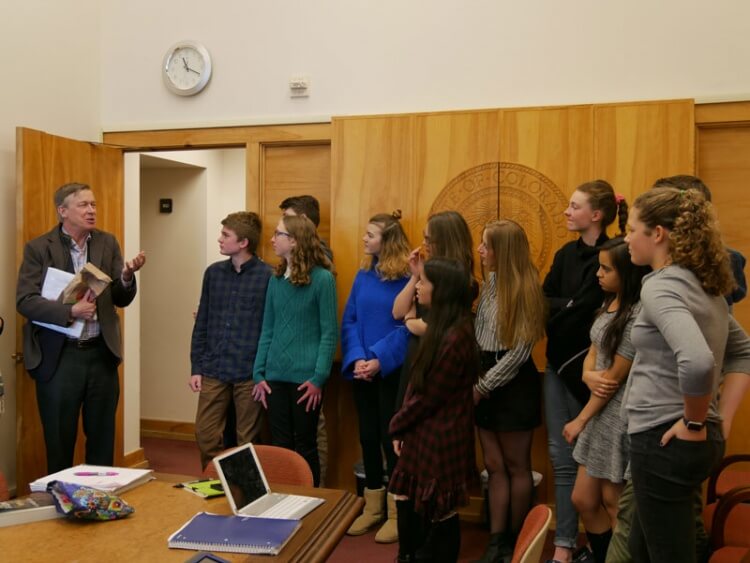
“I learned that homeless people often have jobs. In fact, they may have more than one, but in some cases, they have been unlucky,” she says. “And the cost of housing in Denver makes it very difficult for some people.”
Martha Smith started every day with a discussion of what was on students’ minds. What she heard was the sound of many minds opening. “Students said, ‘I have so many support systems and if something happens to me, I will be okay,’” she says. “They realized they were lucky because not everyone has a safety net.”
After a week visiting agencies that help homeless, Elle had a new understanding of the issues and she also had new questions. “Many homeless people are mentally ill, but do we cause that because we avoid them and try to pretend the problem doesn’t exist?” she asks. “People who are ignored start to question their own existence. But homeless people are just victims of different circumstances—they are not different in their humanity.”
Students also participated in additional Intensives on these topics:
- Immigration history and policy in the United States and Denver
- Developing curriculum and teaching immigrant children
- Nuances of immigration law
Student feedback after the Intensives was overwhelmingly positive, and CA plans to offer the program to freshmen again next year. But what will be the long-term results of these six days of intensive study? Students already knew how their outlooks had changed. As one student wrote in his post-Intensive survey, “I might incorporate this experience into my life by not judging people before I meet them. Not having an open mind can be dangerous.”
